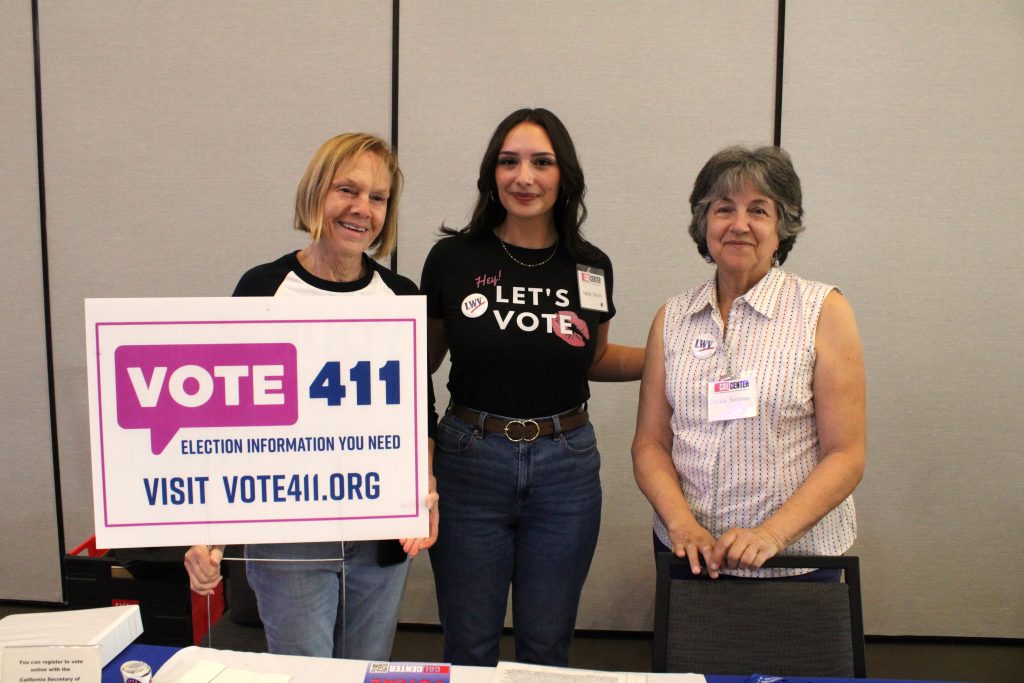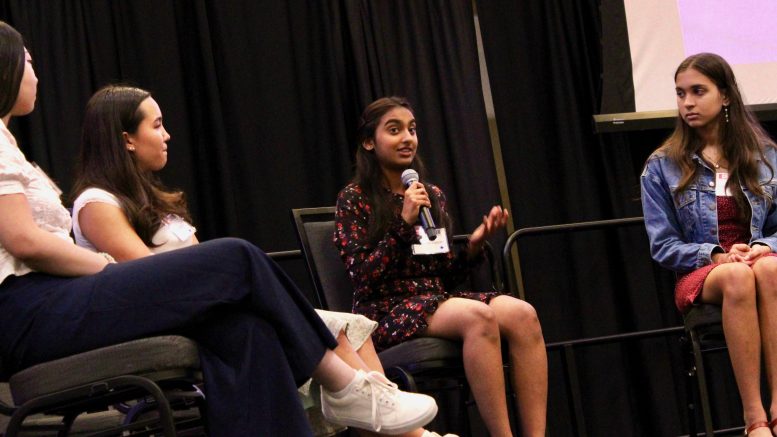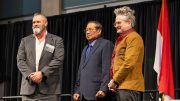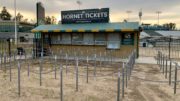By Jacob Peterson
The California Center for Civic Participation (CalCenter) held its r(E)volution! event at Sacramento State to introduce attendees to some of the voices in civic youth engagement on Aug. 27.
The event featured panels from both youth and adult activists representing various organizations. CalCenter Executive Director Clarissa Laguardia emphasized the importance of leading by example in Sacramento.
“There’s really a movement building here,” Laguardia said. “There’s a lot of political power focused here in the state capital, and we really want to take that to the rest of the state.”
The youth panel consisted of Mina Fedor, Supriya Patel, Anushka Kalyan, Celine Qin and moderator Luka Davis. The adult panel featured Angela Chavez, Noel Mora, Lexie Tesch, Nick Soliz and moderator Daniela Pardo.
Prior to the panels, Tesch, program manager with the League of Women Voters of Sacramento, said she was excited to hear what the members of the youth panel had to say.
“These younger generations are very involved in politics, so it’s a good thing to give them an opportunity to speak,” Tesch said.
Tabling with Tesch for the league was Claudia Bonsignore, vice president of the Sacramento chapter, who also stressed the importance of youth civic participation.
“We’re trying to encourage participation in the voting process,” Bonsignore said. “We get many people who say “I don’t vote,” and I don’t get upset, instead I try to offer more information for them.”
Youth panelists were asked what inspired them to become involved in civic engagement. Patel founded the Sacramento chapter of Fridays for Future, a youth-led climate action group, at the age of 13 after the devastation of the Camp Fire in Paradise.

Kalyan, a co-founder of VR’ing Democracy, a virtual reality education model, said she was inspired to take action after she saw her grandparents being unable to vote despite being citizens due to a lack of knowledge regarding the voting process and language barriers.
For Mina Fedor, founder and executive director of AAPI Youth Rising, social justice issues encouraged her to become engaged in civic action.
“I had learned about the increase in hate against Asian Americans during the pandemic,” Fedor said. “I saw members of the community being attacked.”
The youth panelists also discussed the importance of better understanding young voters and how to get their attention. Patel said many Gen Z and Gen Alpha voters need mobilization. “We care about foreign policy and economic policy,” she said. “You’re not going to get our support by doing a silly dance on social media.”
The importance of providing a pace for young people to participate in the civic arena was also a topic of discussion.
Celine Qin, founder and executive of The Reclamation Project @ 916, said civic engagement is much more than just voting.
“We must build avenues and methods for youth to organize even after the ballots are turned in,” Qin said. “That is how we engage in understanding for our young people.”
Following the youth panel regional leaders from various sectors took the stage, addressing topics like how to increase youth engagement.
“I can say from an institutional perspective, students know state and federal government but not local,” said Mora, community partnership coordinator with Sac State’s Community Engagement Center.
Chavez, who works with Courage California as its director of communications and public affairs, said another issue was an ongoing lack of investment in youth.
“What kind of resources can I show you and give you so you can demand more?” Chavez asked.
Soliz, board and commissions coordinator for PRO Youth and Families, also said one of the larger issues is youth not seeing themselves in the picture of civic engagement. He said that when people think of those involved in something like city council, they think of business people and lawyers but don’t include themselves in that crowd.
The panelists discussed their own experiences engaging with youth. Saliz noted younger people’s competency with technology, while Chavez said that volunteering was a great way for young people to get more involved.
Tesch said that having worked with youth and hearing what they have to say has influenced how she engages with them, saying part of making civic action more engaging is to relate it to everyday life.
At the end of the panel, participants shared some of the resources their respective organizations have to get youth excited about engagement. Web resources include Courage Score and Vote 411, as well as resources at Sac State such as volunteering and learning opportunities through its Community Engagement Center.
CalCenter Board Member Matt Henigan, who spoke briefly at the opening of the event, said afterwards that it was great to see so many people come to support the center. One person in attendance was Gabrielle Collins who learned of the event through social media and said she was incredibly impressed by the speakers on the youth panel.
“It was great to see an event like this that is empowering the youth,” Collins, who has a master’s degree in leadership, said. “A lot of these kids are going to be voting citizens, so it’s important to work on lifting them up.”
‘This story is part of the Solving Sacramento journalism collaborative. Solving Sacramento is supported by funding from the James Irvine Foundation and James B. McClatchy Foundation. Our partners include California Groundbreakers, Capital Public Radio, Outword, Russian America Media, Sacramento Business Journal, Sacramento News & Review, Sacramento Observer and Univision 19.




Be the first to comment on "CalCenter works to engage the next generation of civic activists with r(E)volution! event"